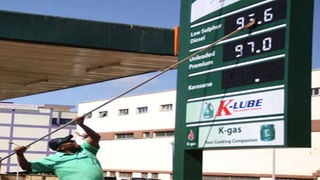
A worker adjusts fuel prices at a Kenol Kobil petrol station in Eldoret Town.
Business
Premium
Outcry as Kenyans feel pinch of high fuel prices
Basic fuel prices have risen at the sharpest pace in 26 months, inflicting a cost pinch on homes and businesses struggling to recover from debilitating knocks of the Covid-19 pandemic.
Kenyans in February paid 13.8 per cent more on average for basic fuel products such as petrol, electricity and cooking gas — piling up cost pressures in an economy that largely depends on fuel for transportation, manufacturing and farming.
Fuel prices have become a considerable force driving up inflation, a gauge of average changes in annual cost of goods and services at a time the government is keen on stimulating economic activity battered by measures put in place to stem the spread of coronavirus.
The Kenya National Bureau of Statistics (KNBS) data shows fuel inflation, which at 13.8 per cent in February was the highest since December 2018, and the biggest driver of overall inflation which edged up to a 10-month high of 5.78 per cent from 5.69 per cent in January.
Economists reckon an increase in cost of fuel pushes up consumer prices of most manufactured products as well as lower-and-middle-income homesteads and hotels, which rely on liquefied petroleum gas for cooking. The high cost of fuel has seen a sharp rise in consumer goods such as cooking oil and even farm products such as green vegetables.
Fuel cost comprises the second largest weight on Consumer Price Index, which is used by the KNBS in calculating inflation, at 14.61 per cent after food and non-alcoholic beverages, which account for 32.91 per cent.
The KNBS data for February indicates that motorists paid 3.1 per cent more for a litre of petrol on average compared with a year earlier on the back of recovering crude oil prices amid weakening of the shilling against major international currencies.
The data, however, shows that petrol and diesel prices rose by sharper spikes of 7.57 per cent and 5.66 per cent month-on-month in February, further pushing up the cost of transportation by 2.33 per cent as compared with January.
The government has come under heavy criticism for continued heavy taxation on fuel, with a consumer lobby calling the taxes and levies “immoral and unsustainable”.
Latest analysis by Energy and Petroleum Regulatory Authority shows that fixed taxes and levies now make up more than 42 per cent of price of fuel per litre.
“It (taxation on fuel) is extreme, immoral and not sustainable in terms of making the economy recover. It’s something that we cannot sustain as an economy,” Consumers Federation of Kenya Secretary-General Stephen Mutoro.
“It’s time we revise the taxes and levies (on fuel) because many people are unemployed, the shilling is weakening and crude oil prices are rising.”
Taxes and levies, for example, account for Sh56.42 or 48.98 percent, of the Sh115.18 that motorists are currently paying for a litre of petrol in Nairobi for the month ending March 14. The rise in fuel prices, coupled with requirement for public service vehicles not to carry more than 60 per cent their capacity as part of Covid-19 containment measures, has seen commuters pay as much as 67.3 per cent for fare compared with February 2020.
Households consuming 200 kilowatt-hour (units) of electricity per month are also parting with 4.5 per cent more to Sh4,476.72, the KNBS data shows.





